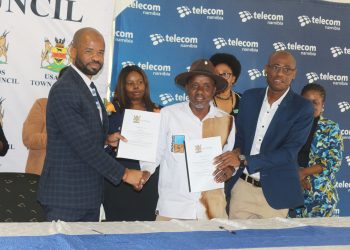
Information and Communication Technology Minister Peya Mushelenga says Namibia’s potential to become a leading innovative country in the ICT sector is limited by low investment in technologies and lack of sufficient professionals.
He made these remarks at the launch of the Huawei Seeds for the Future programme, which will train 25 undergraduate students from local universities.
The programme will be held virtually in Windhoek from 21 to 28 August 2023.
Mushelenga said Namibia has been chasing its dream of becoming an advanced digitally propelled nation by the year 2030. To achieve this, the country has developed an ICT blueprint that will enable it to fully utilise technology and innovation to turn around its economy.
Over the last two decades, Namibia has also developed a viable ICT infrastructure to reinforce robust economic development sustainably. As a result, thousands of base stations have been built, including hundreds of 4G base stations.
“Huawei Technologies, in partnership with the Government and other players, has contributed immensely to this modern ICT revolution,” said Mushelenga. “The Seeds for the Future program is in line with the ministry’s digitisation strategy and our mission to provide an efficient national information communication technology delivery framework and maintain national cyber security.”
The Minister added that the programme will help cultivate and pool together ICT professionals and students, thus boosting ICT industry growth, driving the development of different sectors, and contributing to lower unemployment rates over the long term.
The ‘Seeds for the Future’ program is Huawei’s biggest global flagship Corporate Social Responsibility programme which seeks to develop local ICT talent, enhance knowledge transfer, and promote a greater understanding of the telecommunications sector among the youth in the countries where they operate.
Huawei launched the first Seeds for the Future programme in 2008 to help local ICT professionals and students to fill gaps between theory and practice and master the required skills in the ICT sector. It also encourages countries across different regions to participate in the construction of digital communities.
“Due to the global Covid-19 pandemic, in 2020, we launched the online version of the program for the first time and over 3,000 students from 103 countries participated in it,” said Huawei Telecommunication Technologies Namibia managing director Zhang Qiyuan.Â
“By the end of 2021, 12,413 students from 137 countries and regions around the globe have benefited from the programme,” he added.
Huawei has been operating in Namibia since 2005 and has played a significant role in upgrading Namibia’s ICT infrastructure.
“We also have been doing our best to invest in the ICT soft infrastructure, which is the ICT talents and ecosystem,” said Qiyuan.Â
“The Seeds for the Future programme was first launched in Namibia in 2014, with the support from the Ministry of ICT, the program has provided opportunities to over 80 local students to learn cutting-edge ICT technologies, practical skills, and Huawei certifications.”Â
In addition to the Seeds for the Future program, Huawei also plans to support Namibia’s digital transformation through talent programs like the Huawei ICT Academy.
According to Qiyuan, Huawei ICT Academy is a partnership between Huawei and Academies around the world. Through this partnership, he says the academy delivers general and professional Huawei ICT technologies training, encourages students to get Huawei certification, and develops talents with practical skills for the ICT industry and the community.Â
Meanwhile, Namibia University of Science and Technology Vice Chancellor, Erold Naomab, applauded the fact that a Smart Classroom will be set up at the campus’ Hypertext Transfer Protocol Secure (HTTPS), in partnership with HUAWEI.
 “The Classroom will be instrumental to the implementation of HUAWEI-led programmes such as the Seeds for the Future and ICT Academy,” added Naomab.
Â
Â
Â











